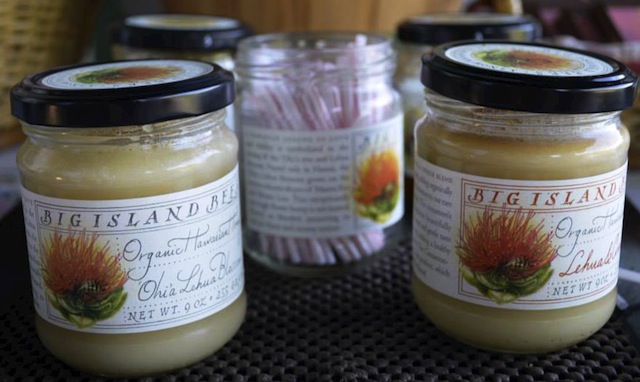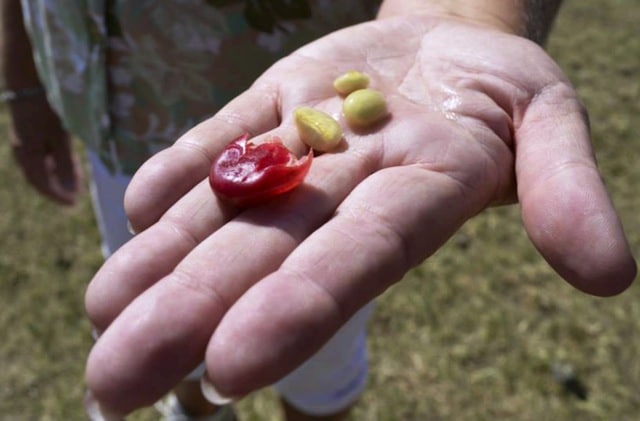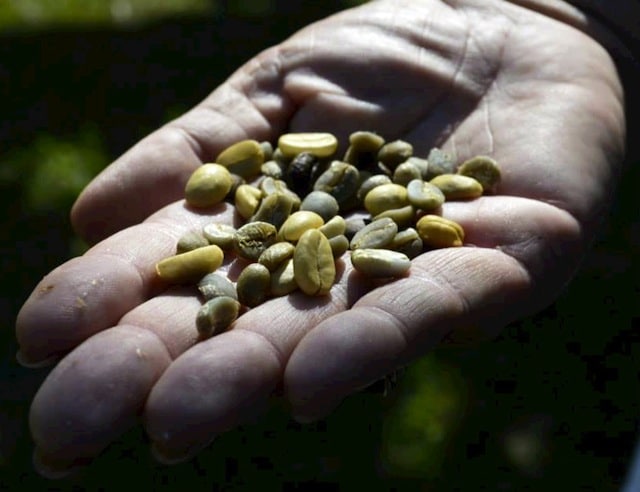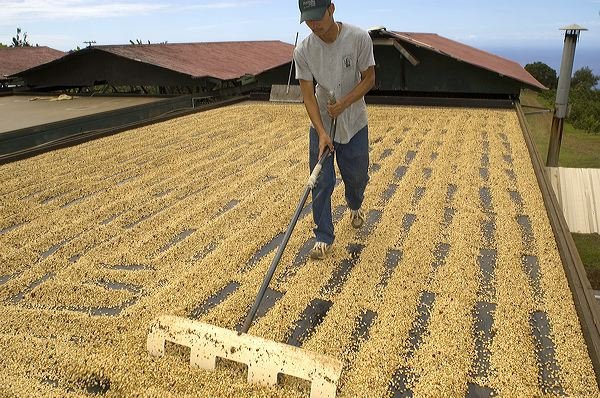
“If you can’t read, spell or say the word, don’t eat.”
I’m currently at Greenwell Farms in Hawaii’s famous Kona Coffee region, enjoying a complimentary tour and tasting. Greenwell is one of the oldest and largest coffee producers in Kona, serving a pure, sustainably-created product made from hand-picked coffee beans. And despite the laid-back atmosphere of Big Island, it offers one of the world’s most enjoyable caffeine fixes.
I came for the tour not only to learn more about coffee and take advantage of the free samples, but also to taste an exclusive coffee only available at their farm, through their online store or through their discounted Coffee Club. They do this to ensure their coffee remains 100% Kona Coffee and their reputation never gets marred from rancid beans left on a grocery store shelf.
It all started back in 1850 with an English man named Henry Greenwell. After hurting his back working in the California Gold Rush, he moved to Hawaii for some rest and relaxation. This is when he and his wife Elizabeth began a farming venture that would win a “Recognition Diploma” at the 1873 World’s Fair in Vienna. After attempting to plant coffee beans in various places around the Big Island, he discovered Kona’s volcanic soil — courtesy of the beautiful Monaloa and Monakae Volcanoes — altered the coffee beans to give an extremely smooth flavor.
This is also due to the weather, as it tends to rain in January and February, leading to a white flowering referred to an “Kona Snow.” These flowers eventually become coffee cherries, which become ripe about seven months later.

Free coffee tasting at Greenwell Farms
Today this family-owned enterprise is in its 4th generation (some 5th generation work on the property, as well), featuring over 70 acres (25 hectares) and working with more than 300 local farmers. Their location is in the heart of the Kona Coffee Belt, with a diverse elevation of 800 to 3,000 feet (244 meters to 914 meters). Onsite, they have their own pulping and drying facilities, dry mill, bean grading facility and storage facility.
Kona’s harvest season runs from about September through March, with up to five rounds of harvesting in each field taking place and pickers filling 100-pound (45-kilogram) burlap sacks of coffee cherries. On average, pickers can pick 25 pounds (11 kilograms) of coffee cherries in an eight-hour shift, although some very quick workers can manage 40 pounds (18 kilograms). It’s tough work, but rewarding in the end.
The experience begins right outside the shop with a free tasting — anyone is welcome to bring a cup anytime from 8:30am to 4:30pm — that begins with a smooth Medium Roast and ends in a seasonal Autumn Harvest with notes of pumpkin and spice.

Greenwell Farms also offers a complimentary tasting of local Big Island Bees honeys
“We don’t start you with the flavored coffees for a tasting because it will take over your palate for the rest,” explains Peggy, my tour guide. “And while we’re not against milk and sugar, you should taste it on its own first to really appreciate the flavors. This is true for all coffees. Otherwise, you won’t be able to tell if it’s gone bad as milk can hide this.”
There’s a long list of other satisfying coffees I get to sample: a smooth, medium-bodied Full City Roast; a robust and sweet Dark Roast; a rich Espresso; a flavored Macadamia Nut Roast; a dessert Chocolate Macademia Nut Roast; and a unique blend of their three most popular coffees called Kona Chameleon, to name a few. There’s also a table serving samples of the local Big Island Bees organic honey. Once I’ve had my fill, Peggy leads me onto the farm, where I’m greeted with avocados, papayas, bananas, cocoa, lychees, macadamia nuts and of course, endless rows of coffee cherries.

Coffee bean inside the coffee cherry at Greenwell Farms
“We grow a lot of fruits; however, while everyone thinks we grow cherries, we don’t. These are actually the fruits the coffee comes from,” Peggy says, breaking open a ruby red fruit, a color which indicates the bean is ready to be picked.
I taste the skin, which is juicy and sweet. As Greenwell Farms doesn’t like to waste, they use these skins — which have eight times the antioxidants of blueberries — to create super-healthy juices and powders. Additionally, after the beans are hand-picked, they’re soaked for 10 hours. The leftover sugar water gets donated to local farmers to raise grass-fed beef.
The process continues with the beans being dried in the sun and raked continuously every 30 minutes until the sun goes down. After this, they’re stored for 45 days to remove any leftover grassy flavors.
“Every coffee bean has a silver lining,” Peggy says, as we walk over to the dry mill. “Unfortunately for coffee beans it’s acidic, so it gets polished off here. The layers — called parchment — are then used for garden mulch.”

Different sizes of coffee beans at Greenwell Farms
She then picks up a handful of different sized beans, informing me that the bigger the bean, the better the coffee. Because of this, there is a grading system: Extra Fancy, Fancy, Number 1, Prime (which is not considered Kona Coffee, but Hawaiian Coffee), and a rare Peaberry. This is a fruitier, more acidic coffee, that’s more expensive due to the difficulty is takes to find.
On the tour I also learn about dark roasts. As coffee beans are roasted multiple times they become darker and darker, as well as smoother, with less acidity. No matter how dark the coffee is, however, it will keep the same caffeine level.
Interestingly, coffee came to Kona in 1828, with trees imported from Brazil and Guatemala. The reason it can be considered Kona and Hawaiian coffee, however, is because, like wine, coffee beans have a terroir, with the soil changing the flavors of the beans. I’m further convinced coffee is similar to wine when I learn Greenwell makes a Private Reserve Estate 100% Kona Coffee, carefully picked at just the right moment for optimal flavor.

Drying the coffee beans in the sun at Greenwell Farms. Photo courtesy of Greenwell Farms.
“Remember to tell your friends to visit us, and bring a cup!” laughs Peggy, as we near the end of the tour. “We serve free coffee everyday of the year, except Thanksgiving, Christmas and New Years.”
At Greenwell Farms you know you’re always getting 100% Kona Coffee. No matter where you get your cuppa joe on Big Island, make sure to read the label to see if it’s 100% Kona Coffee, as if it’s any less you could be getting an acidic coffee with a touch of the good stuff, which means the taste will be negatively affected.
Travel Tip: About five minutes down the street you can visit the Donkey Balls Factory and Store, home to a specialty Hawaiian chocolate — made in-house using Guittard Chocolatebased — on a local legend that comes in unique flavors like “Crusty Balls” (milk or dark chocolate with toffee); “Blue Balls” (dark and white chocolate with blue coloring); “Prickly Balls” (dark and white chocolate with pineapple); and “Dirty Balls” (milk or dark chocolate rolled in cocoa powder), to name a few. Best of all, they offer lots of free samples.

Jessica Festa is the editor of the travel sites Jessie on a Journey (http://jessieonajourney.com) and Epicure & Culture (http://epicureandculture.com). Along with blogging at We Blog The World, her byline has appeared in publications like Huffington Post, Gadling, Fodor’s, Travel + Escape, Matador, Viator, The Culture-Ist and many others. After getting her BA/MA in Communication from the State University of New York at Albany, she realized she wasn’t really to stop backpacking and made travel her full time job. Some of her most memorable experiences include studying abroad in Sydney, teaching English in Thailand, doing orphanage work in Ghana, hiking her way through South America and traveling solo through Europe. She has a passion for backpacking, adventure, hiking, wine and getting off the beaten path.








